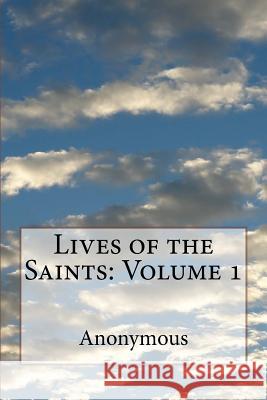Lives of the Saints: Volume 1 » książka
Lives of the Saints: Volume 1
ISBN-13: 9781541305625 / Angielski / Miękka / 2016 / 190 str.
OF THE ADVENT OF OUR LORD The time of the Advent or coming of our Lord into this world is hallowed in Holy Church the time of four weeks, in betokening of four divers comings. The first was when he came and appeared in human nature and flesh. The second is in the heart and conscience. The third is at death. The fourth is at the Last Judgment. The last week may unnethe be accomplished: for the glory of the saints which shall be given at the last coming shall never end nor finish. And to this significance the first response of the first week of Advent hath four verses to reckon. Gloria patri et filio, for one, to the report of the four weeks, and how it be that there be four comings of our Lord, yet the Church maketh mention in especial but of twain, that is to wit, of that he came in human nature to the world, and of that he cometh to the Judgment and Doom, as it appeareth in the office of the Church of this time. And therefore the fastings that be in this time, be of gladness and of joy in one part, and that other part is in bitterness of heart. Because of the coming of our Lord in our nature human, they be of joy and gladness. And because of the coming at the Day of Judgment, they be of bitterness and heaviness. As touching the coming of our Lord in our bodily flesh, we may consider three things of this coming, that is to wit, the opportunity, the necessity and the utility. The opportunity of coming is taken by the reason of the man that first was vanquished in the law of nature of the default of the knowledge of God, by which he fell into evil errors, and therefore he was constrained to cry to God: Illumina oculos meos, that is to say, Lord, give light to mine eyes. After, came the law of God, which hath given commandment in which he hath been overcome of impuissance, as first he hath cried: There is none that fulfillleth but that commandeth. For there he is only taught, but not delivered from sin, be holden by grace, and therefore he was constrained to cry: There lacketh none to command, but there is none that accomplished the commandment. Then came the Son of God in time when man was vanquished of ignorance and impuissance. To that if he had so come tofore, peradventure man might say that by his own merits he might have been saved, and thus he had not been bound to yield thanks to God. The second thing that is shown us of this coming is the necessity by reason of the time, of which the apostle Paul speaketh, ad Galatas the fourth chapter: At ubi venit plenitudo temporis, when the plenitude or full time of the grace of God was ordained, then he sent his Son that was God and Son of the virgin and wife which was made subject to the law. To that, that they be subject to the law he bought them again, and were received sons of God by grace of adoption. Now saith S. Austin that many demand why he came not rather. He answered that it was because that the plenitude of time was not come, which should come by him, that all things were ordained and made, and after when this plenitude of time came, he came that of time past hath delivered us, to that we shall be delivered of time, we shall come to him whereas no time passeth, but is perpetuity. The third thing that is showed to us of this coming is the utility and profit that cometh for the cause of the hurt and sickness general. For since the malady was general, the medicine must be general, whereof saith S. Austin that: Then came the great medicine, when the great malady was through all the world. Whereof the holy Church remembereth in the seven anthems that be sung before the nativity of our Lord, where the malady is showed in divers manners, and for each demandeth remedy of his malady of prisoner out of the prison that sitteth in darkness and shadow of death. For they that have been long in prison and dark places may not see clearly, but have their eyes dim.
Zawartość książki może nie spełniać oczekiwań – reklamacje nie obejmują treści, która mogła nie być redakcyjnie ani merytorycznie opracowana.











